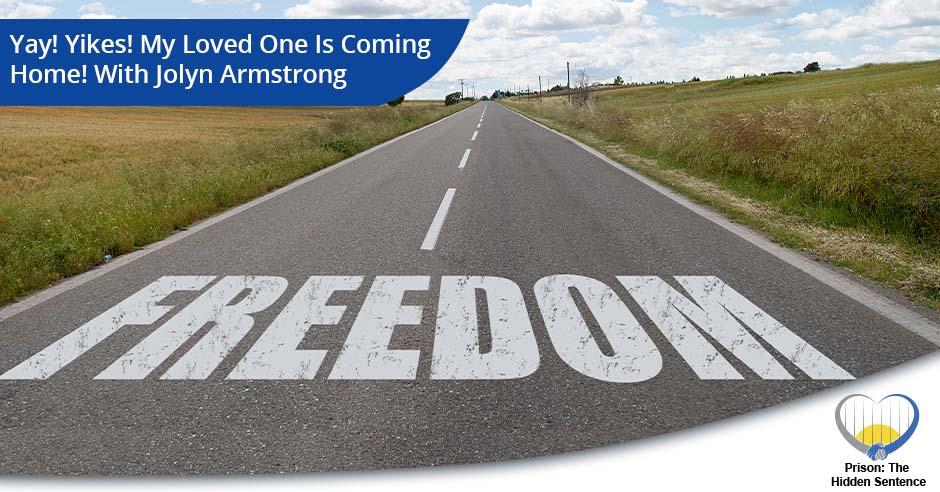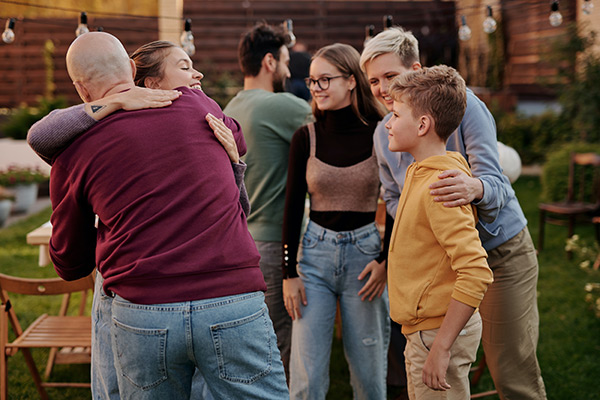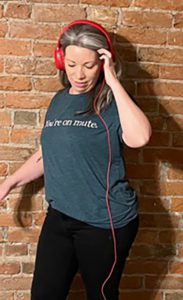
Is your loved one coming home from incarceration? Jolyn Armstrong, Certified Trauma Recovery Coach, talks with Julia Lazareck about the challenges you face when helping them reintegrate back into society. The key is to re-evaluate circumstances and boundaries. For example, when Jolyn’s son came home, it was new to him that he could call for a doctor appointment himself. Because while he was in prison, he had to ask her to do so for him. Having a stable home and gentle communication are essential factors. Tune in if you want to learn more about making the coming home process work.
—
Listen to the podcast here
Yay! Yikes! My Loved One Is Coming Home! With Jolyn Armstrong
I’m here with Jolyn Armstrong who’s the mother of a returning citizen and Founder of The FOTA Project. We’re here to talk about re-entry, how to prepare for your loved one’s homecoming. Thank you so much for being here. It’s always a pleasure speaking and working with you.
Thanks for having me. I love joining you on this show.
We have so much to talk about. Can you tell everyone what FOTA stands for and why you started it?
The FOTA Project is the business that I started after my son was arrested and went to prison. It knocked me to my knees. I needed some help and was all alone at that time. FOTA stands for Families of the Accused and it is my way to help other families go through this experience together and have some guidance along the way. My son is home and doing well. It has been great.
That’s so wonderful to hear. We know that all re-entry isn’t as smooth as it was with your family and that each family has a different experience. A lot of families have misconceptions about the re-entry experience. We started talking about that and wondering how we can help them. After speaking to several families, they asked us to put together a workshop and we did. It contains information and is so helpful for them. Could you share with everyone what we’ve been working on?
I am so excited about this workshop. The information in this workshop has helped so many people already. We go through the process of re-entry that a lot of people don’t realize starts way before release. We talk about pre-release, what family members and their loved ones can do during incarceration and how to prepare for when they stay. It’s all of the things that happen there. We move into life after release as well. We can talk about details if you want to. We always address self-care for family members during that whole process.
When our loved ones know our boundaries, it gives us the freedom to work within them. Share on XThere’s so much good information in there. What people don’t realize is when somebody is coming home, it’s not the same person. They’ve been institutionalized. Many people we’ve spoken to who have had loved ones come home said that they thought that everything would be the same when their loved one came home. What we’re doing is explaining to people that people change.
It’s not the same person and there are things that they can do to prepare for their loved one coming home that’s going to make it easier, not only for the whole family but also for society because the person’s going to come back and we call them returning citizens, as a contributing citizen to society, which is important. For your son, he was pretty fortunate that when he came out, he had your support. Can you tell us how your family supported him and how he’s doing?
He did have a lot of support around him. If you ask him, he talks about that being a huge contributing factor to the success that he’s had in transitioning back into society. You’re right. They’re not the same person coming out. That’s one of the common misconceptions. We address that in the workshop as well. We have a whole worksheet around that. “What are your expectations on what release and re-entry are going to look like both for you and your loved one?”
The answers to some of those questions are always very interesting because none of us have been through this before where we have loved ones coming back from prison. We don’t know what to expect and that’s what this workshop is all about. It’s not just the support since my son has been released. It was what we did during his prison sentence too. We talk about participating in programs, how visitation works and how to communicate with your loved one during prison to keep that relationship and that bond strong or make it even stronger so that the transition back out will be smoother.
As you always say, it starts on day one. You started working with him when he was initially incarcerated and this is information that’s in the workshop too that you can work with your loved one. You can provide them with guidance so that they can help themselves. Don’t people think on the outside that it’s their responsibility to do things for their loved one that felt guilt, shame or all those feelings?

Yes. “What is my role?” That’s one of the questions. “How involved do I need to be? What’s my responsibility here? What’s my loved one’s responsibility while they’re incarcerated, preparing to come back home and after release as well?” It’s some of the topics we cover that don’t even occur to people until they’re in it already. Giving that heads up beforehand and during the process is invaluable.
One of the things too that you talk about is boundaries. It’s not only setting boundaries when your loved one is incarcerated but also when they come home. I love that section of the workshop where you talk about setting boundaries and how you can do it. Sometimes it’s tough love.
The other thing too about boundaries is when we know and our loved ones know what those boundaries are, it gives us some freedom to work within those boundaries. I know what I need to be doing, what my expectation is and what your expectation is. It lays the groundwork for a much healthier relationship when you have these boundaries. Everyone knows, “Here’s what’s okay, what’s not okay, what I need to do and what you need to do.” That is a big part of this workshop.
Could you give us some examples of some of the boundaries you set with your son?
Boundaries look different throughout the process. While he was incarcerated, here’s an example. One thing that happened with me and this happens with a lot of prison families is I got super triggered by my phone ringing because I thought it was him. I can’t answer the phone. It was a real stressor for me. One boundary we set was a window of time for him to call me each day or whatever the schedule was. For us, it worked that he called me each day. For other families, it’s every Sunday afternoon between 2:00 PM and 4:00 PM that they’re going to call. We set a schedule for communication so I knew that when my phone rang at 9:00 AM, it was likely not him and I don’t need to worry about it. I didn’t stress. That was one of the boundaries for communication that was set while he was incarcerated.
Be respectful during the learning process. Share on XIf I could add to that, that story resonates with me because I did the same thing with my brother. I was the same way every time the phone would ring. I’d be like, “Is it him? Did something happen?” I would get so worried so I set up those boundaries too and have that in my book, Prison: The Hidden Sentence. It’s a book about setting those boundaries. That’s one that I did. Thank you for bringing that up. If it happened to you and me, I’m sure that others out there might need to set those boundaries too.
We hear it from time to time when we’re talking to families. I’m thinking of a boundary that we set after release. This wasn’t on purpose. This was him not thinking. My son asked me to call to make a doctor’s appointment. That was early on. At first, I was like, “Sure. If you need this done, this is something I can do for you.” Making phone calls to people while they’re incarcerated is something that we can do on the outside but once he was released, that was a whole new set of circumstances and boundaries that was appropriate for us to set and change.
Since we had been working on our communication all the way through, I was able to tell him, “That’s something you can do for yourself.” For him, he was like, “I can pick up a phone and make a phone call for myself.” This is one thing that surprises families too. They’re like, “What are the things that I’m not even thinking of that are going to change and be unique to our relationship after release?” One of them is what we have been doing for each other all along during incarceration doesn’t fit. We have a whole new set of criteria to work through. That’s a boundary after release that we set that’s been pretty successful.
That makes total sense because you have to realize that when somebody is incarcerated for 6 weeks, 6 months, 6 years or 20 years, they haven’t been able to make decisions and people have been doing things for them. When they come out, returning citizens, not consciously but subconsciously, don’t realize what they can do and by you setting those boundaries and having him make the call, it empowers him and gives him confidence. Taking those small steps when somebody returns home not only helps you by setting those boundaries, not being there all the time that you have to do everything for your loved one and having your loved one take responsibility. That’s a good first step.
Also, there are other things too like household chores. They haven’t had to do a lot of things for a long time so picking some things initially that your loved one can do around the house is important. Don’t forget, they haven’t been on the outside. I might be taking this from somebody but they were on layaway and things have been going on around them but they haven’t been involved in it. When they come out, things have changed. Was there anything that when your son came out that was different that you had explained to him?

We were a little bit lucky in this instance that he served a relatively short sentence. He was incarcerated for about four years but I do know people are coming out of prison who don’t know how to put gas in a car because they went into prison as a teenager maybe, never learned that skill and spent a long time incarcerated. They came back out and have to learn these things as an adult that other adults already know. There are some gentle ways to go about teaching an adult these skills that they haven’t learned. We go through all of those things as well and be respectful during that learning process.
One thing that my son did experience was after four years of being told what to do all day every day, I have a household that I have to take care of myself. Nobody tells me what to do but I have to do it. For me, I was able to make suggestions like, “Maybe every evening before you go to bed, you make sure that your dishes are put in the dishwasher. Maybe that’s something that you could try.” Instead of saying, “Put your dishes in the dishwasher every night.” It was worked on some gentle communication that way, that this is how households are run. My son has not run a household on his own before. Even being in prison for four years, he needed to learn all of those things so there was a definite learning curve with those kinds of things.
There are so many other things too. He was lucky that he could find a place. One of the things that a family needs to decide is, is a loved one going to come home to their house and live with them? Are they going to live in another house or apartment? Do they need to find or help them find a place to stay? Are they going to be in transitional housing? Do they need rehab? There are a lot of decisions to be made before your loved one comes home. It’s so important to be prepared because it’s going to make things so much easier.
A question that comes up for us quite often is, “How do I know when I need to start worrying about housing? If my loved one has three more years on the sentence, what do I do for housing? Do I secure a vehicle?” It’s those kinds of things. They’re like, “What do I do? What is my role here? How much responsibility do I have as a family member in this process? What does my incarcerated loved one need from me to make sure that this stuff is okay? When do I start stressing about it?” If I don’t know when to start stressing about it, I’m going to stress about it.
I don’t want you to stress it out and that’s why we need to do this. We have to come together and talk about it so we have the information. I don’t know if we’d spoke about the roadmap. That would be was so helpful.
A stable home life is one of the biggest contributing factors to successful re-entry. Share on XThat is an incredibly helpful part of this workshop and that is using this roadmap as a way to navigate through this whole process of what to do pre-release, on release day and life after release. We do have this whole roadmap for our families to plot their course with our support through this process and then we work with them on where do we put this part of the process, where does it fit in, how does that fit in and whose responsibility is that. I love that part of this. It makes it so clear for those going through this workshop.
One of the things that also come out is if your loved one is coming home and they’re going to be on parole or in some cases, probation. In parole, a lot of people don’t realize what you need to go through. How do you prepare your house? We spoke about you want your loved one to live there but what are the decisions that you need to make? You don’t tell them what to do. You’re like, “Let’s discuss it and see what works for you and your family and then also the children.”
This isn’t a cookie-cutter process and this is why we can’t hand out instructions like, “Here you go.” If we can have a one-sheet, we’d be like, “This is what you do.” It might be easier for everyone but this is a unique journey for every family going through this. If you have children, there’s a whole other aspect to look at. We want to respect that and help the people going through this workshop through those decisions as well. What does this look like for them? What does the relationship look like? How do we maintain this relationship? If mom is coming home and she’s going to be on parole, what does that mean for her five-year-old? This roadmap helps families lay all of that out and gives them data points to go through. They’d be like, “We’re at this stage. What does this look like? What do I need to be focusing on page two?”
What I like about it is it’s a specialized roadmap to each family. What 1 person’s or 1 family’s roadmap looks like might be different depending on why their loved one was incarcerated, when they’re coming home, how long they’ve been incarcerated, the means of the family, do they have room for their loved one or do they need to put them into rehab. It’s anything that they need to do that they can do for the success of their family.
You talk about family relations and family dynamics because when somebody comes home, that does change. You spoke about how setting boundaries throughout the whole process is so important. Also, responsibilities because when my brother was incarcerated, I felt responsible for so much. How did you handle that with your son when he came home?

Early on in the process, we were all pretty sinking. When I say early on in the process, it was while he was still incarcerated. Soon after incarceration, we were super traumatized. There was guilt all around and so much to it. You’re right. Through communication and some hard work on our relationship through the whole process, by the time release came and when he came home, we were able to talk through what his and each family’s responsibilities were. It wasn’t just he and I but other members of our family too had different responsibilities in our family and relationships.
One thing I felt as a mother early on was I need to work hard to help my children, my son who’s incarcerated and his brothers, maintain a relationship. I took ownership of a lot more of that than I needed. Had I had this roadmap, it might’ve looked a little bit different while he was incarcerated so that’s one reason why I thought that was an important piece to include in this workshop. Where do responsibilities lie for family members? It looks different for everybody. It is very unique to each family but we’re able to walk families through that and maybe give them perspective so they don’t have that.
I love that everybody creates their roadmap. There’s also an addendum to that too that the families can put together. It’s almost like a plan. When somebody first comes home, what are you going to do? What does that look like? That’s part of the expectations part that you spoke about. What is the 1st week, 2nd week or 3rd week going to look like? There’s going to be assimilation back into society especially if they’re living with you and a period of adjustment.
Is somebody going to come out and start working right away? Maybe not and that’s part of the communication and discussion. If they’re not, what are their roles and responsibilities when they come out? Start small. All of this stuff is important to plan, be aware of and work out before your loved one comes home, the first day they come home and after weeks, months and years so they don’t go back. We want to decrease recidivism. We know that having family support and outside support decreases recidivism immensely.
The studies have shown that stable home life is one of the biggest contributing factors to successful re-entry. You’re right. Day 1 coming home from prison is very different than day 7. Day 7 looks very different from day 35. In the first week, make suggestions to your loved one of, “Why don’t we have chicken for dinner? Is that okay with you,” versus, “What do you want for dinner?” You don’t even realize that they haven’t been able to decide however the length of time they’ve been incarcerated so offering them suggestions or a couple of choices rather than having them make a big decision with lots of options can make a huge difference for them. This plan that families put together as part of this workshop for the responsibilities and what the household is going to look like is super important and helpful.
One of the things that I’ve heard from both sides is that families don’t know what their loved ones went through when they were incarcerated. We know that it was a horrible experience. People come out with PTSD and other things so they need time to heal but also, the person that’s incarcerated doesn’t know what the family’s gone through. A lot of times, they hide it from each other. When somebody returns home, it can also be a time of healing and reunification for the family.
It can bring the family closer together but they have to be able to communicate, support each other and move forward in a good, healthy, compassionate way. Jolyn, I want to thank you for everything that you’re doing. It’s such a pleasure working with you and all the information that you have. Is there anything that you want to leave the audience with about re-entry?
It’s such a pleasure working with you too. I love putting this workshop together and presenting it as well with you. Many pitfalls can be avoided when you know what to expect. This workshop has such immense value. I wish it was available when my son first came out of prison but I love being there to support prison families and help in this process. It’s such important work for our returning citizens, their entire family and the community that returning citizens are coming home to. It’s an incredible honor to offer this.
We usually don’t talk about workshops and things that are out there. However, this is so dear to my heart. When I started Prison: The Hidden Sentence, wrote the Prison: The Hidden Sentence book, and started this show, it was so important to get information out. In the years of speaking with people, supporting people, and learning what it’s like when somebody comes out, this is so important and what we’re offering is going to help so many people so I encourage you to go to Prison: The Hidden Sentence website. Look at when the workshops are being offered or if you have questions or want somebody to talk to, we’re here. That’s PrisonTheHiddenSentence.com. Have a wonderful day. Thank you for reading. Thanks, Jolyn.
Important links
About Jolyn Armstrong
 As a Certified Trauma Recovery Coach, Jolyn Armstrong specializes in working with prison families, coaching them through the extremely traumatic experience of supporting a loved one through the criminal justice system. She teaches her clients to use proven techniques to overcome symptoms of trauma including panic, worry, fear, shame and isolation, and find peace and joy in life as they come through the healing process. Jolyn also facilitates support groups that provide a safe space for healing in a group setting and workshops that provide specific education around various challenges prison families face.
As a Certified Trauma Recovery Coach, Jolyn Armstrong specializes in working with prison families, coaching them through the extremely traumatic experience of supporting a loved one through the criminal justice system. She teaches her clients to use proven techniques to overcome symptoms of trauma including panic, worry, fear, shame and isolation, and find peace and joy in life as they come through the healing process. Jolyn also facilitates support groups that provide a safe space for healing in a group setting and workshops that provide specific education around various challenges prison families face.

[…] Episode: Yay! Yikes! My loved one is coming home. […]